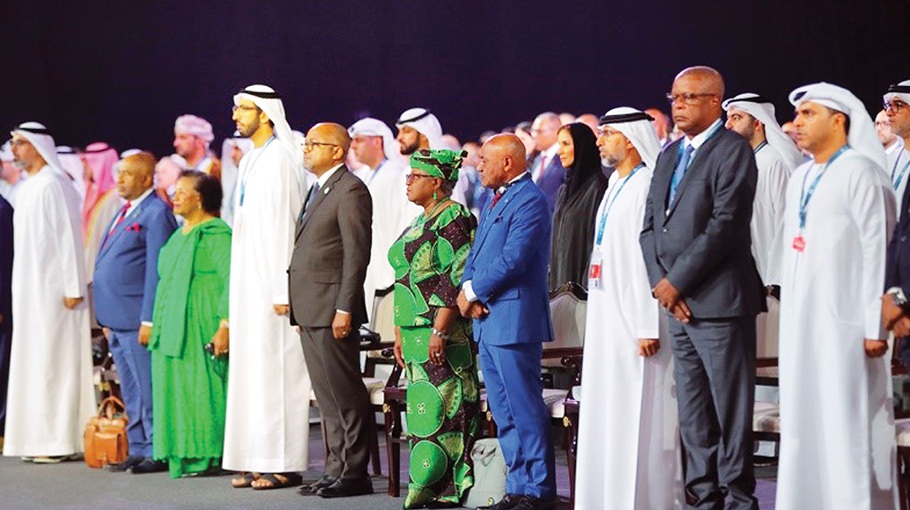Originally posted in Bangladesh Post on 26 February 2024
WTO Ministerial Conference begins in UAE
Enhanced access of LDCs, developing countries to global trading system focused

With a focus on enhancing the access of developing countries and Least Developed Countries (LDCs) to the global trading system, intellectual property, and WTO dispute resolution mechanisms, the 13th Ministerial Conference (MC13) of the World Trade Organisation (WTO) commenced in Abu Dhabi on Monday.
The commerce ministers and senior trade officials of 164 member countries of the World Trade Organization (WTO) have started their four-day formal negotiations, as the Ministerial Conference (MC13) of the WTO is taking place in Abu Dhabi, United Arab Emirates (UAE).
The gathering of 175 Member States, private sector leaders, NGOs, and civil society representatives will allow the global community to work together toward advancing a more efficient, sustainable, and inclusive trading system.
Ministerial Conferences are the highest decision-making body of the WTO and serve as crucial forums for member states to address trade challenges, refine trade rules, and set the agenda for global trade policy.
Sheikh Khaled bin Mohamed bin Zayed Al Nahyan, Crown Prince of Abu Dhabi and Chairman of the Abu Dhabi Executive Council attended as a distinguished guest at the opening session of the four-day high-level conference on Monday morning at Abu Dhabi National Exhibition Centre (ADNEC).
Ngozi Okonjo-Iweala, Director-General of WTO, delivered her inaugural statement at the session. Dr Thani bin Ahmed Al Zeyoudi, UAE’s Minister of State for Foreign Trade and the chair of the conference, also spoke.
She said MC13 will focus on enhancing the access of developing countries and Least Developed Countries (LDCs) to the global trading system, intellectual property, and WTO dispute resolution mechanisms.
“Trade cooperations among the countries and resilience is vital for sustenance, so instead of fragmentation we need to further establish cooperation for effective participation of all countries in global trade” the DG said.
Meanwhile, an eight-member Bangladesh delegation headed by Ahasanul Islam (Titu), State Minister for Commerce, is participating in the conference. Bangladesh is actively working to push the agenda of the Least Developed Countries (LDCs).
Titu said the issue of three years extension of trade benefits after Bangladesh’s LDC graduation is almost finalised while it was a demand of six years extension.
He said the delegation of Bangladesh is well-prepared to highlight and place the issues related to bi-lateral and multi-lateral trade benefit issues with the countries including FTI, PTI, e-commerce, agriculture, fisheries subsidy and dispute resolution.
Prof Musatfizur Rahman, a distinguished fellow of the Centre for Policy Dialogue (CPD) told that MC12 or the last ministerial conference of the WTO had urged the member countries to support initiatives towards smooth and sustainable graduation of the LDCs.
“MC13 should come up with a more definitive commitment, not just the best endeavour,” he said. “So, LDCs need to work hard to bring the continuation of the international support measures in the MC13 outcome document.”
He also suggested that Bangladesh needs to maintain a good network with the LDC-group as the country is still an LDC. At the same time, it needs to make issue-specific bilateral and group-wise (like G-90) coalition.
The opening session also approved the accession of the east African country Comoros and Asian country Timor-Leste or East Timor to the WTO meaning these two countries become the new members of the organisation.
The topmost decision-making body of the WTO is the Ministerial Conference, which generally meets every two years.
The conference creates an opportunity to explore greater collaboration and partnership with non-governmental organisations, the private sector, and civil society to enhance the effectiveness of trade policies and programmes via a series of side events.
These include the TradeTech Global Forum, promoting the use of technology in global supply chains, and sessions on trade facilitation in partnership with Etihad Credit Insurance, trade finance with HSBC, SMEs with the Abu Dhabi Department of Economic Development (ADDED), the WLP Logistics Challenges with DP World, Future of Cargo in collaboration with Emirates, and Sustainable Trade Africa.

